-
Software
-
CAM software
- Tebis Automill
- CNC programming
- CNC automation
- CNC simulator
- Multiple setup
- Robotic machining
- CNC drilling
- Deep-hole drilling
- Combined turn-milling
- CNC turning
- Turn-milling
- 2.5D milling
- 3D milling
- 5-axis milling
- Slot milling
- Trimming
- HPC milling
- HFC milling
- Circle-segment cutters
- Sinker EDM
- Wire EDM
- 3D laser cutting
- Laser hardening
- Laser weld cladding
- CAD software
- CAQ software
- MES software
- Products
-
CAM software
- Services
- Consulting
- Sectors
- References
- Company
- News

-
 Home References
Home ReferencesHigh-tech partner with direct interface
ALPEX Technologies GmbH is a specialized provider of high-quality manufacturing equipment for the production of high performance composite parts. The Austrian company from Mils near Innsbruck defines itself as a professional supplier for manufacturers of lightweight components in the aerospace and automotive industries. Customer demands in this area are very high. To meet these demands, Alpex needs reliable, flexible partners who can respond quickly. Process supplier Tebis AG from Martinsried near Munich is one of these partners.
Company
Alpex Technologies GmbH
Location
Mils, Austria
Focus
Implementation of a new CAM system and process structuring
Benefits:
- Direct contact with the manufacturer as a partner
- Tebis as a technology supplier, implementer and consultant
- Top CATIA-V5 interface
Sector
Mold manufacturing
Die manufacturing
Aerospace
Published
2015

Interviewee: Thomas Jäger, Founder and managing director
Tebis personnel delivered first-class work and even exceeded our expectations. What they said, they also did.
Thomas Jäger, Alpex Technologies GmbH, Mils AustriaMore and more people and goods are traveling around the world every day. There is a growing demand for reliable, efficient and especially light materials for the transport equipment. Lightweight carbon components have been in use in the aerospace industry for more than 20 years, as the weight of every component is especially important. The automotive industry is still in an early development phase as regards carbon. Carbon in the aerospace and automotive industries are two branches with different requirements. In the first branch, key characteristics are large dimensions, scope and statutory quality and safety requirements, while quantities, automation and rapid production count in the second. However, there are overlaps and valuable synergy effects. We have extensive experience with these modern materials, so we can provide the input for new series-capable processes in the automotive industry or for new developments in the aerospace industry. We get the big picture," explains Thomas Jäger, managing director and co-founder of Alpex. Roughly 60 percent of his customers are from the aerospace industry while roughly 40 percent are from the automotive industry.
Identifying individual solutions
Alpex's expertise and innovation are clearly evident in the company's manufacturing facilities: For example, Alpex has developed production molds for the automated series production of the carbon fiber roof structure for the Aventador for Italian sports car manufacturer Lamborghini. Alpex also developed for Lamborghini the first mold of its type in the world with guides for the series production of components by high pressure resin transfer molding (HP-RTM). The special challenge here is to maintain complete leak-tightness of the mold for high-pressure resin injection, despite the guides.
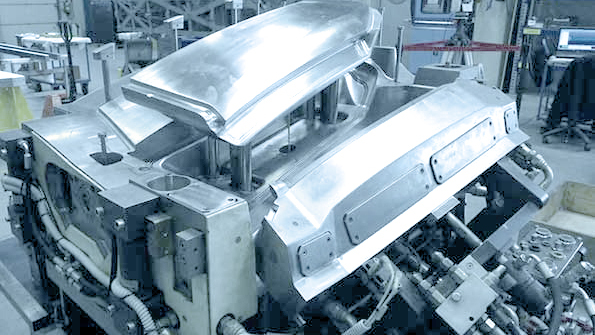 World's first mold of its type with guides for producing the roof shell of a Lamborghini by HP-RTM
World's first mold of its type with guides for producing the roof shell of a Lamborghini by HP-RTM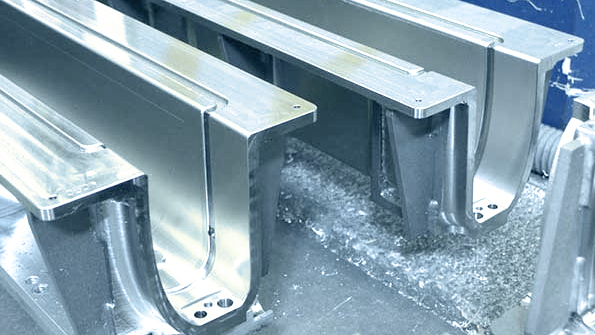 Irkut uses this molding tool from Alpex to produce a flap component for the MS-21 aircraft currently in development
Irkut uses this molding tool from Alpex to produce a flap component for the MS-21 aircraft currently in developmentIf the Russian Irkut MS-21 currently in development is to compete successfully with the Airbus A320 and the Boeing 737, Alpex will play a key role. Alpex supplies molds to Russian aircraft manufacturer Irkut for the production of carbon wing components, air ducts, center wing boxes and flaps for this twin-jet medium-range aircraft. The parts are assembled using assembly devices designed by Alpex.
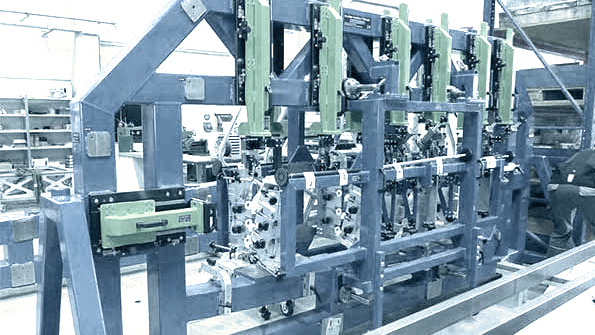 Alpex developed and designed this aileron assembly tool for the MS-21
Alpex developed and designed this aileron assembly tool for the MS-21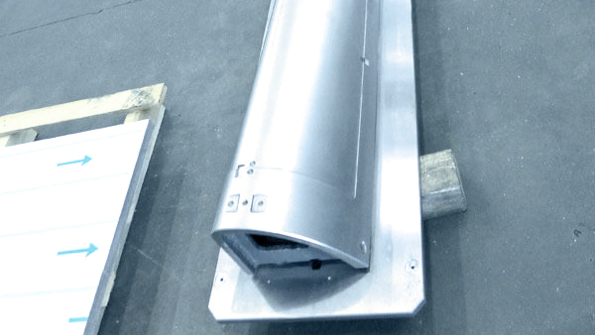 Alpex produces this nose cap lay-up tool for the flaps on the A350 XWB out of Invar, a highly heat resistant material of nickel and steel that does not expand at 180°C and, when polished, yields an extremely smooth surface − the best conditions for producing components from carbon
Alpex produces this nose cap lay-up tool for the flaps on the A350 XWB out of Invar, a highly heat resistant material of nickel and steel that does not expand at 180°C and, when polished, yields an extremely smooth surface − the best conditions for producing components from carbonAs the central contact for overall flap tooling, Alpex developed and produced the production molds and devices for the carbon flaps on the Airbus A350 XWB. Overall, Alpex produced several hundred different molds and devices for tooling of the manufacturing equipment.
Reliability is key
Whether for Lamborghini, Irkut or Airbus or for aerospace or automotive applications, Alpex serves its customers as a complete supplier, from concept and development to fabrication and assembly. R&D therefore plays a very large role at Alpex. Production scenarios must be developed and manufacturing tools designed and optimized. The challenges in this field are different every day, and the components change frequently and quickly in these processes.
Because of this, Alpex decided at the beginning of this year to replace its CAD/CAM system and to rely entirely on Tebis. One of the reasons for choosing Tebis is its direct contact with the manufacturer. "We have to have complete trust in our CAM software provider. If there is a problem, someone from Tebis is always there to find solutions. This can't be measured in financial terms," says Jäger. "We always turn directly to Tebis without detouring through sales partners − and so far, their personnel have implemented all of the promised solutions 100%. This is sensational."
Optimal structuring of CAM processes
The entire process from the decision to phase out the old CAD/CAM system until complete conversion to Tebis took only three months. Tebis Implementation personnel played no small role in this quick reorganization with their enthusiastic support in the processes at Alpex. Tebis individually trained Alpex CAM personnel on site and provided, installed and configured the Tebis software, all within the specified time frame. Thomas Jäger contracted Tebis' CAM process structurers to get the maximum benefit from the investment in Tebis. These specialists prepared the postprocessors in accordance with customer requirements and adapted them on-site. They defined the standard tools and included these as examples in the Tebis tool database, which was subsequently completed by Alpex personnel. In order to standardize the CAM processes at Alpex, Tebis personnel analyzed the processes, set standards and defined example CAM templates based on these. The information distribution was then defined and the NC documentation set up. "The Tebis personnel were able to provide many ideas and initiatives based on their experience, many of which we successfully adopted and integrated in our processes," summarizes Jäger. The project was successfully completed after the test phase. Jäger raises the commitment of the Tebis personnel: "They delivered first-class work and even exceeded our expectations. What they said, they also did."
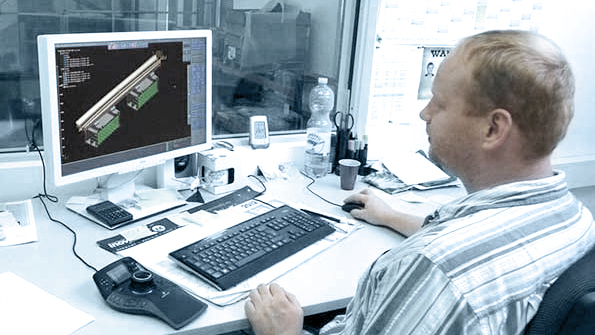 Kai Mattutat at the Tebis CAM workstation, working on the nose cap lay-up tool for the Airbus A350 XWB
Kai Mattutat at the Tebis CAM workstation, working on the nose cap lay-up tool for the Airbus A350 XWBPerfect system integration
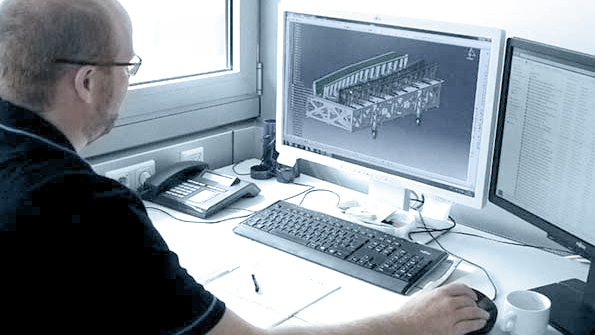 Stephan Oppitz edits the design data for the flap component on the Airbus A350 XWB in CATIA V5
Stephan Oppitz edits the design data for the flap component on the Airbus A350 XWB in CATIA V5Alpex independently produces roughly 60% of all the parts for the manufacturing equipment. These are primarily parts with 3D contours, which is why 5-axis manufacturing is central for Alpex. The entire manufacturing preparation and NC programming are performed on four Tebis workstations. The parts are designed in CATIA V5. "CATIA is a must in the aerospace industry," explains Jäger. This makes a reliable interface between CATIA and the CAM system all the more crucial. According to Jäger, the CATIA-V5 interface in Tebis works perfectly, better than that in the previous system. This is another plus for Tebis.
Poised for the future with a broad product spectrum
Product quality plays an important role at Alpex. No less critical are fast response and efficiency in manufacturing. "Tebis can give us the best possible support with its solid technical expertise," says Jäger. He also values Tebis's broad product spectrum: "Tebis is a technology supplier, implementer and consultant all in one. This is important for us, as we must be technically top notch, able to respond quickly and flexibly to new developments and always improving our processes. I place my complete trust in Tebis for this." In his opinion, Alpex holds potential for improvement in the interface between design and manufacturing preparation/NC programming as well as in further reducing machine downtime. To fully exploit this potential, Jäger first wants to draw on the expertise and experience of Tebis Consulting.
Alpex already has a comprehensive technology base with four complete Tebis workstations, a direct interface to CATIA, 5-axis simultaneous milling machines, 5-axis trimmers, multiple setup, a simulator and two viewer stations in assembly. The system will soon be expanded with the unique Tebis functions for surface correction and optimization.
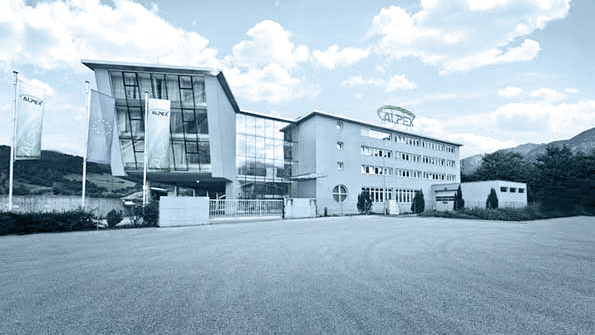 Alpex headquarters in Mils near Innsbruck
Alpex headquarters in Mils near Innsbruck

